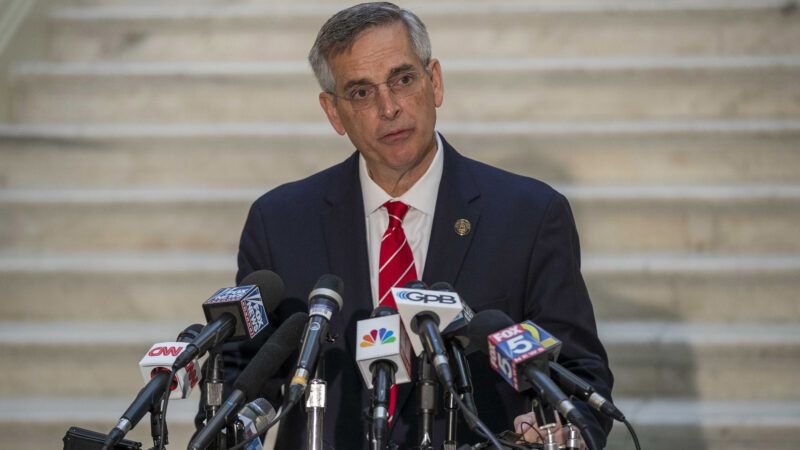Georgia Election Investigation Fails, Once Again, To Find Massive Voter Fraud
Georgia Secretary of State Brad Raffensperger claimed that over 1,000 people voted more than once. He now admits that number is far lower.

Much was made both during and after the 2020 presidential election about rampant voter fraud. This week, yet another of those claims fell apart under scrutiny.
In September 2020, Georgia's Secretary of State Brad Raffensperger announced that more than 1,000 people may have voted more than once in the state's primary and runoff elections that year. Amid ongoing allegations of widespread vote fraud from President Donald Trump, Raffensperger charged that the voters in question returned absentee ballots, and then also voted in person—a violation of both state and federal law. Raffensperger assembled a task force to investigate, and he warned that convictions under Georgia law would garner up to 10 years in prison and $100,000 in fines.
But now, Raffensperger admits that his initial claims were overblown.
The Atlanta Journal-Constitution reported Tuesday that in response to requests for information about the investigation, the secretary of state's office indicated that only around 300 cases of double-voting were ultimately substantiated, "almost always because of mistakes by confused voters and poll workers." Of the 1,339 cases which Raffensperger initially claimed, the confirmed total represents barely more than one-fifth (22 percent), though the paper contends that about 100 cases remain "under investigation."
Even from the outset, the cases that Raffensperger described appeared more like carelessness on the part of election officials than intentional malfeasance by voters. Georgia voters who fill out an absentee ballot may either mail it in or drop it off. They could also go to their polling place and vote in person instead. In that case, according to page 55 of the State of Georgia Poll Worker Manual, the poll worker's terminal will prompt that the voter has been issued an absentee ballot. At that time, the voter would either turn in their absentee ballot to be discarded, or if they did not have it with them, the poll worker would call to verify that the ballot had not been counted before having the voter fill out a form requesting their original ballot be canceled.
If, as Raffensperger alleged, more than 1,000 voters cast more than one vote, by mailing back an absentee ballot and then also voting in person, then in every single case that would require a failure on the part of the state of Georgia or its poll workers.
There is evidence that Raffensperger's office realized this when he first made the claim. According to emails published by American Oversight, a government accountability watchdog group, on the same day that Raffensperger made the announcement about double-voting, Ryan Germany, the general counsel to the secretary of state, was advising members of the task force on the subject: "There are systematic checks to stop double voting from happening, and those checks appear to be largely working as intended. [Some] people likely voted twice inadvertently or because they were not sure if their absentee ballot had been returned on time."
Raffensperger won office in 2018 after an endorsement from Trump. He now faces Trump's ire for refusing to interfere on his behalf in the 2020 presidential election in Georgia, not to mention a primary challenger from the right threatening Raffensperger's bid for reelection this fall.
Long before Trump's attorneys were making the case that elections were stolen by pernicious algorithms developed by long-dead Latin American strongmen, the prospect of widespread voter fraud permeated political discourse. Despite little to no evidence of it on any sort of massive scale, it is still incumbent upon election officials to guard against it, and to pursue any perpetrators who willfully vote more than once or in somebody else's name. It's ironic, then, that amid overselling allegations of electoral fraud, Raffensperger lost the confidence of his party's leader for being unwilling to commit such fraud himself.
